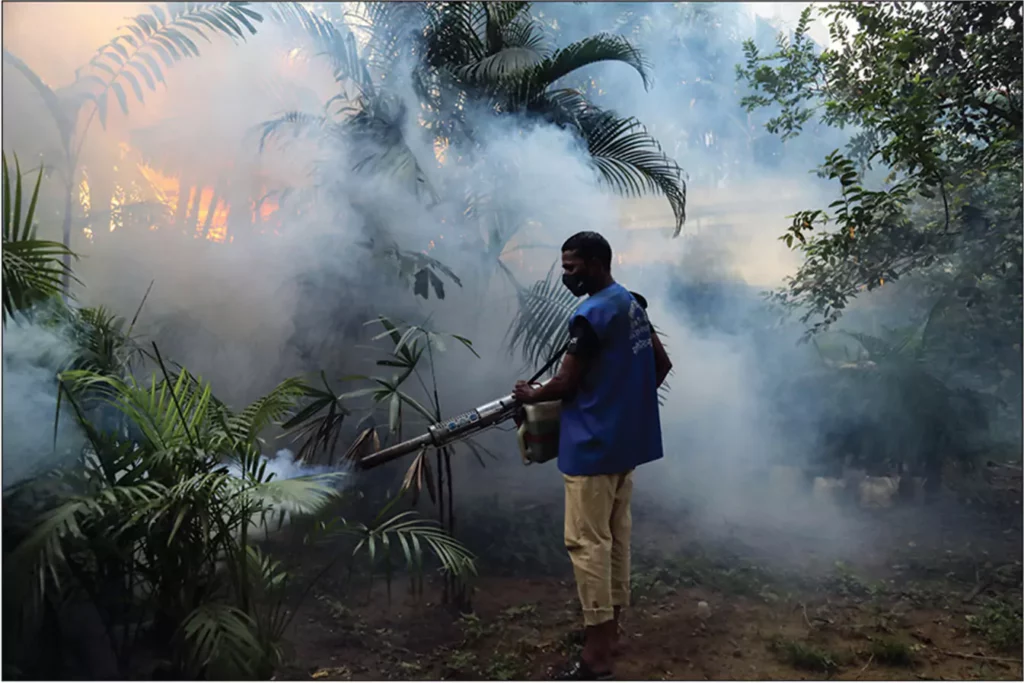The situation in Dhaka is alarming. The city is struggling to cope with the worst dengue outbreak in its history. The disease, which is transmitted by mosquitoes, has claimed the lives of hundreds of people, especially children, in the past year. The health system is overwhelmed by the influx of patients, and many families cannot afford the treatment costs.
In a dimly lit control room at the Directorate General of Health Services (DGHS) in Dhaka, officials grapple with the alarming surge in dengue cases that has overwhelmed Bangladesh. Since the first reported cases in April of the previous year, the nation has witnessed a staggering increase in dengue infections, reaching 321,179 cases and 1,705 deaths in 2023—marking the highest annual death toll ever recorded for this mosquito-borne disease in Bangladesh.
Dhaka is a city of more than 20 million people, where rapid and unplanned growth has created crowded and unsanitary living conditions. Many areas lack proper drainage systems, and stagnant water accumulates in puddles, ponds and canals. These are ideal breeding grounds for mosquitoes, especially during the rainy season.
The government has been trying to control the mosquito population by spraying insecticides and clearing waterlogged areas. However, these measures have not been enough to prevent the outbreak from escalating. Some experts have also raised concerns about the effectiveness and safety of the chemicals used.
The DGHS has also been working to raise awareness among the public about the symptoms and prevention of dengue. The disease can cause fever, headache, muscle and joint pain, nausea, vomiting and rash. In some cases, it can lead to severe complications such as bleeding, shock and organ failure.
Children, constituting approximately 30% of all dengue cases, face heightened vulnerability due to underdeveloped immune systems. Save the Children reports that, tragically, at least 113 children lost their lives in 2023, with a majority under the age of 10 and 38 deaths among those under five.
The severity of the outbreak has strained Bangladesh’s healthcare system, leading to overcrowded hospital corridors and a scarcity of beds. Dr. Mohammad Shafiul Alam from the ICDDR,B health research center in Dhaka describes it as the deadliest dengue outbreak the country has ever experienced.
As the new year unfolds, the crisis persists, with 756 cases and 10 deaths reported in the early weeks of January alone. However, experts caution that official figures may underestimate the true extent of the outbreak, as several healthcare facilities operate beyond the reporting framework.
Dengue cases globally have surged, with Asia bearing 70% of the burden. The World Health Organization (WHO) estimates that half of the world’s population—3.9 billion people—is at risk of dengue infection. Factors such as climate change, characterized by extreme weather events, increased mosquito populations, and prolonged dengue seasons, contribute to the escalating prevalence of the disease.
In Bangladesh, the current outbreak is exacerbated by unusual weather patterns, including high rainfall, elevated temperatures, and humidity, fostering an environment conducive to mosquito breeding. Climate change emerges as a critical factor in the rising number of cases.
The outbreak’s atypical characteristics include an earlier onset and a broader geographical spread beyond Dhaka and Chattogram. Dengue is now reported in all 64 districts of the country. In response, the DGHS has repurposed hospitals designated for COVID-19 patients to address the dengue crisis, increasing the supply of essential medications nationwide.
For Bangladesh’s urban poor, grappling with socioeconomic challenges, the added financial strain of dengue exacerbates the burdens on households. As families struggle to afford hospitalization, preventative measures at home, such as using repellents and mosquito sprays, become essential for those affected by the relentless outbreak.



